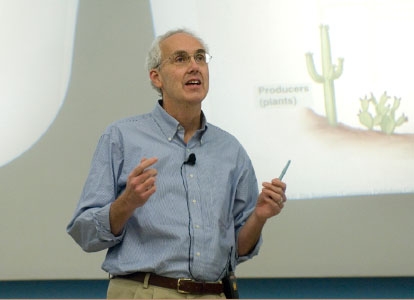Professor Dennis Minchella featured in The Purdue Review
12-17-2014

I have a double major in Geology and Biology, so another choice was to become a geologist. But I prefer teaching young people rather than searching for oil. I've always wanted to be a teacher.
[I chose to teach at Purdue because] I earned Ph.D. here, and it is a strong university. I am comfortable here, and Purdue has given me opportunities to grow as a person and in my career. It seems like every five years I switch jobs and move along the career ladder. Besides being a biology professor, I'm also the Associate Dean for Undergraduate Education in the College of Science. I think that as long as a place opens up career opportunities, individuals usually stay there and are happier.
So why did you decide to base your research on parasitism?
Parasites are clever and some are deadly for humans. Research on parasites is important because they are not well studied, even though they make up half of the organisms on Earth! Their complex life cycles make them difficult to study, and most people shy away from working with pathogens. Parasites have evolved life cycles and life history strategies for surviving in their host. For example, 1 in 5 people in the world have Ascaris, a large parasitic roundworm that migrates through our body and lives in our gut (*points to a giant jar in his room filled with roundworms).
What do you like to do during your free time?
I like to travel, I like to read, and though I don't like to, I mow my lawn and rake leaves. I also visit my grandchildren who live in Chicago. I think those are the major activities in my life. School definitely keeps me busy because I have three different parts of my life: teaching, research, and then I have an administrative part, which includes going to meetings and running programs. It definitely keeps me active. But I like the split, it's like having three different jobs.
Being Associate Dean, we have been able to create programs that facilitate student success. We've created Feasting with Faculty, Learning Beyond the Classroom, COSINE help center, and more. We believe it's important that students learn more than just science and math. And outside the classroom is actually a better place to learn certain skills, like leadership and intercultural awareness. The College of Science definitely encourages experiential learning.
Could you tell us a little more about your professional experiences, particularly those not mentioned in your homepage or resume?
Well, I've traveled to six out of the seven continents, presenting and conducting research. I lived in Australia for a year, in Brisbane. Took my whole family and that was a valuable experience for our children. I've also conducted fieldwork on parasites in Egypt and Brazil! We were working in villages that had a high prevalence of the disease schistosomiasis. The parasite goes through snails, and then people. We were studying the genetic diversity of the worms. We asked questions like: if we both had worms in our veins, are your worms the same genetically as mine? If not, do these differences result in different symptoms or drug resistance?
If I were a genie and I could grant you one wish, what would it be and why?
I'm actually quite happy, not sure I need a wish! Well, I could wish that all my students would study more, I guess that's a good one. A little more time wouldn't be bad either. And I wish they'd all appreciate my songs in lecture too! But other than that I'm a pretty happy camper, there's not much else that I need.
What strategies did you use to be successful during your undergrad years at Purdue?
My first semester of college as a science major was not successful. I did not do well in any of my courses, partly because I did not always go to class! I played an awful lot of basketball, and I was engaging in other "non-academic" activities outside of the classroom. I realized that I needed to prioritize my studies as I was not going to the NBA. Time management is clearly number one, making time for your studies. That turned out to be the most important part. My competitive nature also helped me in class as well. Like, "If you can get this grade why can't I?" But I also met my future wife when I was a freshman, you never know what will happen in college. So being organized definitely helps. It helps me now, like I mentioned I have three lives here!
Interview by Kenny Nguyen